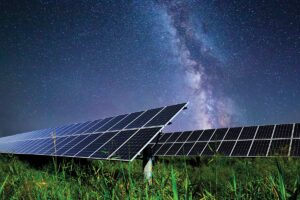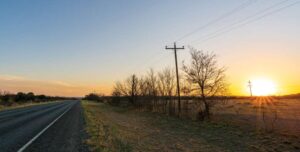As policymakers explore infrastructure needs and options, they should look beyond urban centers, roads and bridges and take a hard look at the needs of rural America.
That’s something electric co-ops do every day as businesses that are built by and belong to rural communities. As owners of critical infrastructure, co-ops also play an important role in our nation’s economy — supporting nearly 612,000 American jobs and generating $88 billion annually in goods and services.
More than 2,000 electric co-op leaders visited Washington from April 29-May 1 to advocate for their communities. They encouraged policymakers to focus on crafting a robust infrastructure package — one that helps improve the economic outlook for all communities.
Specifically, Congress should support three key infrastructure investments: modernizing the electric grid; expanding rural broadband access; and further electrifying the economy.
Modernizing the electric grid
Electric co-ops are making strategic infrastructure investments that give local communities the flexibility to adapt to tomorrow’s energy needs. That’s why co-ops have launched community microgrids, lead the nation in the deployment of community solar facilities, and have invested in new XPRIZE research on carbon capture and use.
Part of these investments focus on developing the energy grid of the future, which leverages the two-way flow of data to ensure smarter electric distribution. Grid modernization investments allow for better technology advances in front of — and behind — the meter and benefit both co-ops and consumers. Collectively, they enable the adoption of new technology, promote security and bolster resiliency.
Lawmakers should support electric co-op modernization efforts by funding research and development programs that enable the use of artificial intelligence and technology to maximize possibilities from grid-enabled devices.
Congress should invest in programs that promote more efficient data transfer and feedback between transmission and distribution systems and support development of distributed energy resources to help enhance resiliency and reliability.
Expanding rural broadband access
Access to broadband infrastructure is essential for a modern economy. Yet an estimated 24 million Americans lack access to this resource. More than 100 electric co-ops are working to solve that problem and expand broadband access. Another 200 are conducting broadband feasibility studies.
Congress should support an expanded combination of grants and loans to build on pilot programs and provide rural communities with the broadband access necessary for education, telemedicine and a 21st century economy.
Lawmakers should improve the accuracy of federal broadband coverage data maps to accurately identify coverage gaps and enable federal resources to be used to close the digital divide.
Electrifying the economy
Substituting electricity for other energy sources can provide meaningful economic and environmental benefits. Electrifying the transportation sector, for example, would lower vehicle emissions, improve air quality and reduce petroleum consumption.
Co-ops support policies and investments that promote electrification throughout the economy, including the expansion of electric vehicle use and charging infrastructure to optimize the grid, improving the management of electricity use and integrating renewable energy resources.
Congress should support renewable energy advances alongside the development of increased energy efficiency and interoperability standards in appliances and utility electricity management assets.
The right infrastructure package can make a critical difference in the direction of many rural communities. A bipartisan focus and congressional support are critical.








